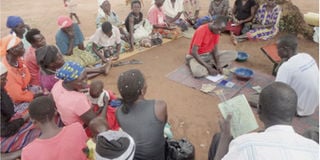Prime
Rural savings scheme boosts household income

Members attend a Village Savings and Loans Association meeting in Bugiri District while Kintu (C) looks on as a farmer weighs produce at his store. Photo BY Ephraim Kasozi
What you need to know:
Importance. It has created a monetised rural economy as villagers have to save money every week which has reduced the subsistence sector.
Access to financial services is a decisive factor in fighting poverty and generating revenue among the rural households.
However, financial institutions in rural areas are distant and the process involved in accessing them is not favourable for the rural semi-literates. Until December 2011, Yafeesi Kintu did not know what it meant to be financially independent and did not have capital to start a business.
“I used to see people meeting and counting money every week but I did not know the benefit until I asked my neighbour who introduced me to Bakusekamajja, a Village Savings and Loans Association (VSLA) in Bugiri District,” says Kintu.
Kintu recalls that although saving was a difficult decision in a rural area, joining gave birth to his produce business. He deals in maize, soy beans and cassava; an idea he conceived after training from the group.
Kintu, a secondary school dropout who started by saving Shs10,000 now owns a store that purchases produce from farmers, a business he started two years ago when he acquired a loan worth Shs100,000.
“Although I had never acquired a loan, I was not afraid because the group is governed by people from the area who encouraged me after training to work hard to generate income,” says Kintu, one of the 25 member group.
Kintu who has since acquired another loan worth Shs200,000 for purchase of seeds to expand his business now plans to buy another piece of land to construct a house.
He is one of the hundreds of poor people who have benefited from the newest trend in the microfinance initiative, VSLA. Millions of people like Kintu survive on meagre and erratic earnings. About 2 million people in Uganda who live on less than Shs500 a day do not have access to formal banks, says Care International in Uganda.
VSLA, a scheme initiated by Care International in Uganda, based on savings rather than debt and managed by members of the community. It is a group of 10 to 25 people who save together and take small loans from those savings.
How it works
The activities of a VSLA run in ‘cycles’ of about a year, after which the accumulated savings and profits are shared out among the members according to the amount they have saved.
Lilian Mpabulungi, the programme officer of Care International in Uganda, describes VSLA as a demonstration that communities living in poverty with a little organisation have the capacity to turn around their lives.
She explains that the VSLA approach has proven to be the most appropriate for Uganda given that more than half of the country’s population lives in rural areas and are outside the bracket of the cooperate banking industry.
“They can neither save nor access financial and loan services from the mainstream industry because they do not meet the requisite necessities of the corporate class,” adds Mpabulungi.
She says that VSLA enables members access to highly responsive financial services to upscale economic activities, improve household welfare, acquire business skills and educate their children.
She suggests: “While Uganda is in the process of strengthening the micro-finance sector, the VSLA approach should be reflected in the national micro-finance policy for it to be firmly entrenched in the country.”
Results from the global Finscope III survey of 2013 indicate that the population of financially excluded adults in Uganda reduced from 4.3 million, about 30 per cent of adults in 2009 to 2.6 million (15 per cent of adults in 2013).
“Much of this growth has been happening in the non – bank formal categories and the best drivers for this change are people in the countryside operating with the VSLA,” reads the report.
Zaitun Nambozo, a member of Kyatuyo VSLA in Busia who secured a Shs100,000 loan to boost her food joint business says she has since got the ability to save, acquire a loan and invest.
“This has compelled people to work hard to generate weekly savings,” Ms Nambozo said.
ABOUT THE RURAL SAVINGS GROUP
A VSLA is governed by rules agreed upon by members but sits every week to deliberate, save and borrow. However, due to absence of a regulation, VSLAs are faced with the challenge of low levels of loan repayment.
Mpabulungi says advises government to pass the Micro-finance policy that will recognise self-help group like the VSLA model as an effective path for financial inclusion especially for the lower and marginalised populations.
VSLA has promoted financial literacy and built financial knowledge in villages.




